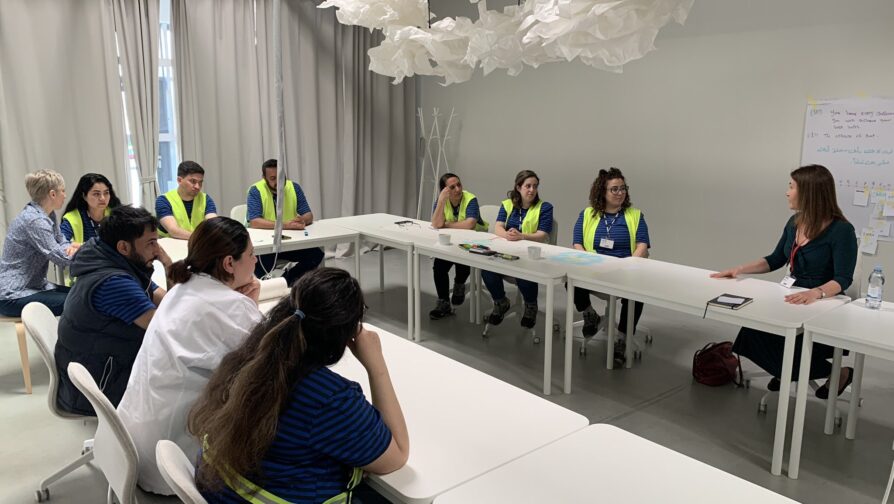In a rather dark period of her life, Layal Hosh, a refugee from Syria, knew a place on the edge of Zagreb where she could always find a light: IKEA.
She was living in a reception centre for asylum seekers at the time. A fellow asylum seeker told her: “There’s this fantastic mall, where the wi-fi and refill drinks are free and you can spend all day looking at beautiful things.”
Layal, 33, and her husband Emile, 40, took the bus and discovered the Swedish store for themselves. “We used to go there for little ‘holidays’,” she laughs. “We didn’t have much money but we could afford to buy a candle.”
Did it ever cross her mind that she might one day work for IKEA? “Actually yes,” she says, “at least I wanted to.”
Now Layal has a paid internship at IKEA. Her colleagues speak highly of her. “Layal is optimistic, radiating positivity,” says Lidija Jagic, 42, who works in the company’s People and Culture Department.
IKEA is a major global partner for UNHCR. Worldwide, it employs over 2,500 refugees in more than 300 stores. In Croatia, the internship scheme for refugees has been running for two years – last year IKEA took 15; this year 10.
In addition, IKEA has made substantial donations of furniture. Having supported a home for unaccompanied children in Zagreb in 2021, it is turning its attention this year to the needs of a similar home in Split.
The chance to work at IKEA has done wonders to boost the self-confidence of refugees around the world, as Layal’s broad smile testifies.
“I like the practicality of IKEA,” says Layal, “things inside things, the colours, the simplicity, the mix. I love it all.”

Layal and fellow interns attend the introductory session on the first day of internship @J.Kapic/UNHCR
Layal came from the Syrian port city of Latakia. She studied to be a translator and worked variously as a shop assistant, a representative in a telecommunications company and a secretary.
She met Emile, who is Egyptian, in Jordan. They married in Latakia in 2014 but soon after moved to Egypt, and then on to Europe. They had religious reasons for leaving the Middle East. They flew as tourists to Croatia, where they applied for asylum in April 2016.
And so they found themselves in the reception centre for asylum seekers.
But Layal was not the sort of person to feel sorry for herself. She threw herself into volunteering, mainly translating for others. Her fluent English was an asset and she started to pick up Croatian too.
Good news came for the couple in October 2016, when they were granted protection status in Croatia. They were able to move into a small rented flat. Later Layal’s parents, Ghada and Tony, joined them from Syria and the family moved into a larger flat in Zagreb, where they live now.
Layal remembers her old flat in Latakia, decorated in the Syrian way, with lots of woodwork and textiles in dark colours. “We had a dark green tweed divan, transparent white curtains with green curtains over them and lots of traditional stuff from my grandma. I had to dust it every day.”
In their flat in Zagreb, the brown leather divan belongs to the landlord but it is scattered with IKEA cushions – turquoise, yellow, white; one with tapestry. “The flat looks like a second IKEA,” jokes Layal, who bought these bright Scandinavian items with a gift card friends gave for her birthday. She was still not working at IKEA at this point.
Securing a livelihood in a new country is one of the hardest things for refugees. Emile is working as a taxi driver. Layal made a brave attempt to set up her own beauty salon but it coincided with the Covid-19 pandemic and didn’t work out. “The timing was not right,” she says.
Then she heard from friends that for the second year running, IKEA had opened applications for interns. “Within 15 minutes, I applied,” she says. She was given a three-month internship, which has been extended to four.
Now she proudly wears the blue striped teeshirt and yellow jacket of an IKEA worker. She’s with the logistics team, checking orders made online and making sure they reach the right addresses. The job involves a safe degree of lifting and packing and she also has contact with customers in the store.
The team of interns – from Syria, Iraq and Iran – are all good friends. “We are a community,” Layal says. “We help each other.”
Layal, who makes mosaics and jewellery for a hobby, would like to develop her creativity. But for now her focus is on the job she has. “I will give 100% of my energy to what I am doing now,” she says. “I want to be good at what I am doing, so I can be better in future.”
The time is approaching when IKEA will decide whether Layal’s internship turns into full-time employment. Of the 15 interns who were taken on last year, nine got permanent jobs. “Fingers crossed,” says Layal, giving another of her radiant smiles.
Podijeli na Facebook-u Podijeli na Twitteru